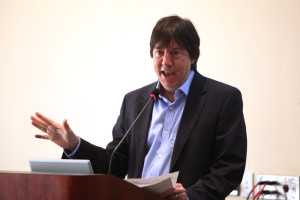
It took an invitation to speak at DCSWA’s Professional Development Day for Joel Achenbach to consider himself a “real” science writer, notwithstanding decades of accolades for writing about an array of scientific topics. Despite his recent initiation into our ranks, Achenbach shared powerful advice focused on making science comprehensible for our audiences, and he elicited plenty of laughs along the way.
“Show me the guy with the tank of liquid helium on his back at the South Pole,” he said, referring to the hard labor done by researchers seeking gravitational waves that would provide evidence of cosmic inflation following the Big Bang. Achenbach emphasized introducing narrative and conveying science as a human process rife with uncertainty, “not just a stack of facts.”
He also encouraged us to “go ahead and ask the dumb question.” Inquiring what President Clinton keeps in his pockets or what the fossilized “chicken from hell” might have tasted like led to vivid stories. And don’t worry about what scientists may think—you owe it to your readers to thoroughly understand your material. “I don’t care if they think I’m dumb,” Achenbach said.
At the same time, it’s important to develop relationships with scientists. When Achenbach was tasked with writing a story about the initial BICEP2 findings on an extremely tight deadline (he laughed about missing an email with this subject line: “Major discovery about the universe to be announced Monday”), he called up scientists who knew the subject well, and every last one came to the rescue.
Achenbach also provided practical tidbits. “The number one rule of science writing is to get it right and be fair,” he said. Even in today’s frantic news world, he encouraged taking time to revise and printing out copy for editing. Cut your copy, don’t rely on adverbs and adjectives, and remember that the end of a story is as important as the beginning. If you’re stuck, do more reporting. And big ideas require short sentences.
Achenbach was optimistic about the future of science journalism. In the end, science writing “tells a story about real people doing things,” he said. That never goes out of style.
